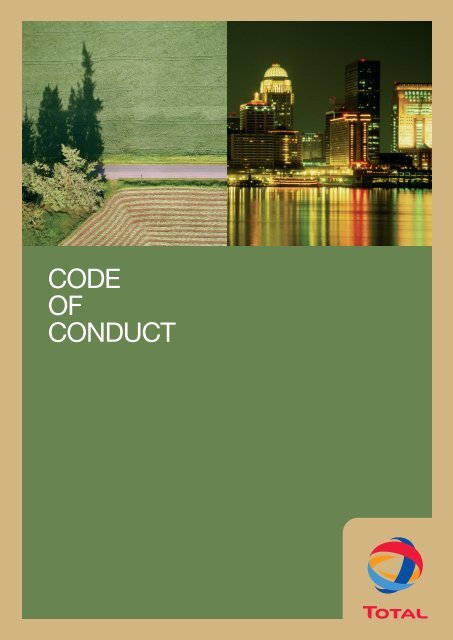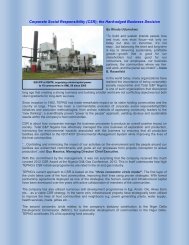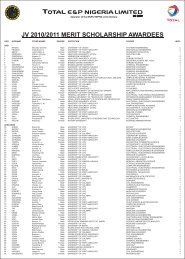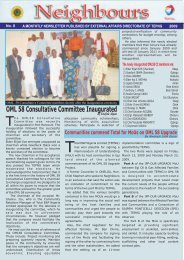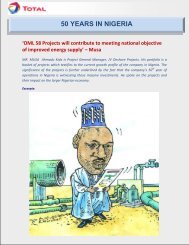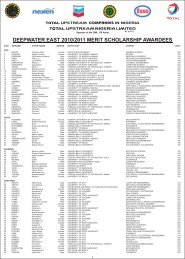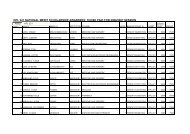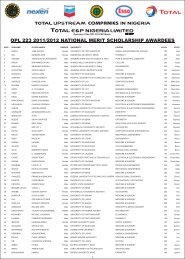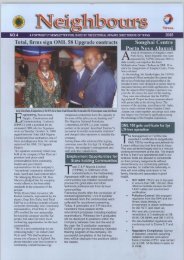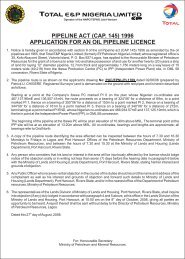Code of Conduct
Code of Conduct
Code of Conduct
You also want an ePaper? Increase the reach of your titles
YUMPU automatically turns print PDFs into web optimized ePapers that Google loves.
CODEOFCONDUCT
L CHIEF EXECUTIVE OFFICER’S MESSAGE 2L BUSINESS PRINCIPLES 4L RULES OF INDIVIDUAL BEHAVIOR 12L THE ETHICS COMMITTEE 18L ETHICS CHARTER 24CONTENTS L 1
L Chief Executive Officer’s MessageTotal is a world-class group <strong>of</strong> oil, gas and chemical companies,with operations in more than 130 countries and nearly 100,000employees from a wide diversity <strong>of</strong> backgrounds and in a broadrange <strong>of</strong> pr<strong>of</strong>essions. As a result, our growth and long-term viabilitydepend on all <strong>of</strong> us embracing the ethical shared values andprinciples that motivate and guide our day-to-day undertakings.Expressed in our <strong>Code</strong> <strong>of</strong> <strong>Conduct</strong>, these values and principlesare critical to the success <strong>of</strong> an integrated company like ours.Our ethical commitment is based on three core values:• Respect, the source <strong>of</strong> sustainable, trust-based operationsand relations.• Responsibility toward others and in our jobs.• Exemplary behaviour, which underpins the internal andexternal credibility <strong>of</strong> our actions and initiatives.For these ethical values to have a meaningful impact, they haveto be expressed through a certain number <strong>of</strong> business principlesapplied in our sphere <strong>of</strong> activity—upholding human rights, anongoing concern with safety and environmental protection, respectfor everyone we work with, integrity towards the company and inour business relationships, non-interference in political processes,and support for colleagues, host communities and businessespartners.2 L CHIEF EXECUTIVE OFFICER’S MESSAGE
In every unit, senior management is responsible for instilling theseethical values and ensuring that the corresponding principles areapplied.You can consult the Ethics Committee on any issue related toapplication <strong>of</strong> the <strong>Code</strong>, in particular to help you to make anysensitive decisions that may arise in the course <strong>of</strong> your work.It is through these fundamental principles that we will be able tobuild the strong, sustainable growth that benefits everyone. I knowI can rely on each and every one <strong>of</strong> you to apply the <strong>Code</strong> <strong>of</strong><strong>Conduct</strong> appropriately in your day-to-day work.Christophe de MargerieChief Executive OfficerCHIEF EXECUTIVE OFFICER’S MESSAGE L 3
LBUSINESSPRINCIPLES4 L BUSINESS PRINCIPLES
Total is a world-class oil, gas and chemicals group with industrialand commercial operations spanning oil, gas, power generation,renewable energies and chemicals in more than 130 countries.Our growth is based on shared core values.As a responsible industrial group, Total is committed tosupporting efficient and properly managed utilization <strong>of</strong> ourenergy sources and products. We take into account the needs<strong>of</strong> today's consumers and the interests <strong>of</strong> future generationsthrough an active policy <strong>of</strong> environmental stewardship that is anintegral part <strong>of</strong> our sustainable development strategy.We provide regular and transparent reports.These business principles are our reference point and gohand-in-hand with the objective <strong>of</strong> continued growth, benefitingshareholders, customers and employees, and contributingto the economic and social development <strong>of</strong> the countrieswhere we operate.BUSINESS PRINCIPLES L 5
As a general principle, Total:Comply with all applicable laws, regulations and decisions<strong>of</strong> the United Nations and the European Union, especiallyconcerning the environment, competition and employment.Is sensitive to the concerns expressed by international,European Union, governmental and non-governmentalorganizations in matters concerning our operations.Observes the rules <strong>of</strong> free competition.Rejects bribery and corruption in all forms, whether publicor private, active or passive.Total strives to uphold:• The principles <strong>of</strong> the Universal Declaration <strong>of</strong> Human Rights.• The key conventions <strong>of</strong> the International Labour Organization.• The OECD Guidelines for Multinational Enterprises.• The principles <strong>of</strong> the United Nations Global Compact.6 L BUSINESS PRINCIPLES
L ShareholdersTotal strives to earn the confidence <strong>of</strong> its shareholders,with the objective <strong>of</strong> providing them with a pr<strong>of</strong>itable investment.We regularly provide full and transparent information toall shareholders and are attentive to their concerns, specificallythrough the Shareholders’ Advisory Committee.We comply strictly with applicable stock exchange regulationsand report our activities accurately in our financial statements.BUSINESS PRINCIPLES L 7
L CustomersTotal provides customers with quality products and services,and strives at all times to <strong>of</strong>fer them the best performanceat competitive prices for their particular requirements.We are attentive to our customers’ needs, continuouslymonitoring, assessing and improving our products, services,technology and procedures to deliver quality, safety andinnovation at every stage <strong>of</strong> the development, productionand distribution process.8 L BUSINESS PRINCIPLES
L EmployeesTotal has confidence in the loyalty, motivation, competence andsense <strong>of</strong> responsibility <strong>of</strong> its employees.We expect them to adhere to the highest standards <strong>of</strong> integrityand avoid any conflict <strong>of</strong> interest.We pay particular attention to our employees’ working conditions,respecting individuals, avoiding discrimination, and protectingtheir health and safety.We include our employees in our development by encouragingthe distribution <strong>of</strong> information, dialogue and consultation.We respect their personal lives.We recruit personnel solely on the basis <strong>of</strong> our requirementsand the specific capabilities <strong>of</strong> individual applicants.We develop their pr<strong>of</strong>essional skills and careers withoutdiscrimination regarding race, gender, or affiliation with a political,religious, or union organization or minority group.All employees have an annual performance review withmanagement once a year, at which objectives are set,performance assessed and career development discussed.Career development is facilitated by appropriate training.BUSINESS PRINCIPLES L 9
L Suppliers and Service ProvidersTotal’s policy regarding our suppliers and our service providers is to:• Respect each party’s interests, with transparent and fairlynegotiated contract terms.• Expect them to adhere to principles equivalent to thosein our <strong>Code</strong> <strong>of</strong> conduct.L Business PartnersTotal applies its Business Principles and Rules <strong>of</strong> IndividualBehavior whenever it leads or operates a joint venture.When we do not lead or operate a venture, we require theleader or operator to apply principles that are compatible withour Business Principles and Rules <strong>of</strong> Individual Behavior.10 L BUSINESS PRINCIPLES
L Host CountriesIn conducting its businesses, Total respects the naturalenvironment and the cultural values <strong>of</strong> host countries.Total respects the sovereignty <strong>of</strong> all States and refrains fromintervening in or funding the political processes.However, we reserve the right to express to governmentsour position concerning our operations, employees andshareholders and our belief in the importance <strong>of</strong> respectinghuman rights.Through our operations, we contribute to the social andeconomic development in countries where we operate,particularly local communities.Total rejects all forms <strong>of</strong> bribery and corruption. In particular,Total will not resort to bribery or corruption “in order to obtainor retain business or other improper advantage in the conduct<strong>of</strong> international business,” as outlined in the OECD Conventionon Combating Bribery <strong>of</strong> Foreign Public Officials in InternationalBusiness Transactions.BUSINESS PRINCIPLES L 11
LRULES OFINDIVIDUALBEHAVIOR12 L RULES OF INDIVIDUAL BEHAVIOR
Total’s harmonious development depends in large measureon the trust between the Group and its employees and amongthe employees themselves.Creating and nurturing this trust entails the observance,at all levels, <strong>of</strong> certain rules <strong>of</strong> behavior in situations that can becomplex and in the context <strong>of</strong> potentially hazardous operations.The objective is not to anticipate and make provision for everycontingency in advance. Nevertheless, certain clear, preciseprinciples, together with an individual sense <strong>of</strong> responsibilityand common sense, are a useful reference for everyonein the Group, whatever their business activity.RULES OF INDIVIDUAL BEHAVIOR L 13
L Health, Safety and the EnvironmentEmployees are responsible for ensuring that their involvementin Total’s activities is carried out in full compliance with Grouphealth, safety and environment rules and regulations.L Pr<strong>of</strong>essional RelationshipsEach employee is expected to be loyal and attentive to the quality<strong>of</strong> his or her relationships with colleagues, and to refrain fromany act <strong>of</strong> discrimination.Every employee should try to work as part <strong>of</strong> a team.L Information Technology andCommunication ResourcesTotal’s IT and communication resources are intended forpr<strong>of</strong>essional use. Reasonable personal use may be tolerated,in line with applicable laws and regulations.14 L RULES OF INDIVIDUAL BEHAVIOR
L Customer & Supplier RelationsEmployee relations with customers and suppliers should be fairand honest, in strict compliance with contractual undertakingsand applicable laws and regulations.The giving or receiving <strong>of</strong> gifts or entertainment should remainwithin acceptable limits, having regard to what is customary andthe provisions <strong>of</strong> anti-corruption legislation.In case <strong>of</strong> doubt, employees shall obtain the approval <strong>of</strong> theirmanagement. Under no circumstances may employees solicitgifts or invitations.L Confidentiality and Intellectual& Industrial PropertyEmployees have a duty to take the necessary steps to protectthe confidentiality <strong>of</strong> any information acquired in the course<strong>of</strong> their employment, <strong>of</strong> which they are merely the custodians.Employees shall not disclose confidential information, whetherverbally, in writing, or electronically, unless expressly authorizedto do so by their management.They must also observe the rules and regulations governingintellectual and industrial property.This duty remains in effect even after an employee leavesthe Group.RULES OF INDIVIDUAL BEHAVIOR L 15
L Conflicts <strong>of</strong> InterestEmployees may encounter situations where their own personalinterest or that <strong>of</strong> persons or companies with which they have tiesor links may conflict with the Group’s interest.In such cases, they shall act bearing in mind the Group’sinterests and the loyalty they owe to the Group. In the event <strong>of</strong>doubt, they should consult their management or the EthicsCommittee.To avoid conflicts <strong>of</strong> interest, employees should not:• Acquire an interest in a competitor, supplier or customerwithout the prior written approval <strong>of</strong> their management, or,if such an interest consists <strong>of</strong> listed shares, use privilegedinformation to acquire the interest.• If employed on a full-time basis by the Group, exercise anyoutside pr<strong>of</strong>essional activity without first obtaining the writtenapproval <strong>of</strong> their management.16 L RULES OF INDIVIDUAL BEHAVIOR
L Insider TradingEmployees who have access by reason <strong>of</strong> their employmentto information that is not public and that could affect the shareprice <strong>of</strong> any company inside or outside the Group if madepublic, may not trade in the shares or other securities <strong>of</strong> thecompany in question, either directly or through another person,as long as this information has not been made public.L Political ActivityEmployees who could be considered to represent the Groupshall refrain from political activity in countries where they are notentitled to exercise political rights and where the Group operates.In addition, employees must refrain from doing anything thatwould be contrary to such countries’ traditions or cultures.RULES OF INDIVIDUAL BEHAVIOR L 17
LTHE ETHICSCOMMITTEE18 L THE ETHICS COMMITTEE
The Ethics Committee reports directly to the Chief ExecutiveOfficer. Its composition, scope <strong>of</strong> work, and procedures aredescribed below.Composition and Appointment <strong>of</strong> CommitteeMembersThe Ethics Committee comprises a Chairman and four othermembers. The Chief Executive Officer appoints the Chairman<strong>of</strong> the Ethics Committee. The other members are appointed,with their consent, by the Executive Committee on therecommendation <strong>of</strong> the Chairman <strong>of</strong> the Ethics Committee.The members <strong>of</strong> the Ethics Committee are Group employeeswho collectively have broad experience <strong>of</strong> the Group’s differentbusinesses and disciplines and occupy positions that guaranteethe necessary independence and freedom <strong>of</strong> judgment.Members <strong>of</strong> the Ethics Committee cannot delegate theirfunctions to non-members <strong>of</strong> the Ethics Committee.Each Committee member is appointed for a term <strong>of</strong> four years,unless some other provision is made, to ensure a regularturnover <strong>of</strong> Committee members.An appointment to the Ethics Committee may only be revokedby a written decision <strong>of</strong> all other Committee members.A copy <strong>of</strong> any such decision must be addressed to the ChiefExecutive Officer and to the Committee member concerned.THE ETHICS COMMITTEE L 19
Scope <strong>of</strong> WorkThe Ethics Committee, which reports to the Chief ExecutiveOfficer, is responsible for general oversight <strong>of</strong> ethical issuesrelated to the Group’s activities.The Committee:• Makes recommendations to the Chief Executive Officer onall ethical issues, whether in relation to matters on which theCommittee has made an independent inquiry or questionsthat have been submitted to it.• Notifies the Divisions <strong>of</strong> any risk that Group activities may becontested on ethical grounds.• Ensures that the Group’s <strong>Code</strong> <strong>of</strong> <strong>Conduct</strong> is circulatedand proposes any amendments it considers necessary orappropriate.• Ensures that the procedures are in place for the Group’semployees to become thoroughly familiar with the <strong>Code</strong> <strong>of</strong><strong>Conduct</strong>, understand its provisions and apply them.• Assists in preparing and authorizing any specific <strong>Code</strong> <strong>of</strong><strong>Conduct</strong> that may be necessary for a particular subsidiary.• Recommends procedures for and, at its discretion, providesreplies in the strictest confidence to any question Groupemployees may have concerning application or compliancewith the <strong>Code</strong> <strong>of</strong> <strong>Conduct</strong> in specific circumstances.20 L THE ETHICS COMMITTEE
• Reviews, with the business units concerned, any verbalor written communications relating to ethics in the Group andany contacts related to ethics, in particular with international,European Union, governmental and non-governmentalorganizations.• Reviews, with the business units concerned, replies to anycorrespondence contesting the ethical standards appliedin the Group or by any subsidiary.• Advises the Group’s training departments on incorporating,where appropriate, a presentation on the <strong>Code</strong> <strong>of</strong> <strong>Conduct</strong> intotraining programs, in particular those for new recruits andmanagement.THE ETHICS COMMITTEE L 21
ProceduresEach Division is encouraged to inform the Ethics Committeein advance <strong>of</strong> new projects and proposed changes inan ongoing business activity that could raise an ethical issue byreason <strong>of</strong> its scope or potential impact on local communities.The Chairman <strong>of</strong> the Ethics Committee is provided with all filessubmitted to the Group Management Committee.He or she also receives in advance copies <strong>of</strong> the agendas <strong>of</strong> alldivisional management committee meetings and all RiskAssessment Committee meetings.He may attend meetings <strong>of</strong> the Risk Assessment Committee ordesignate another member <strong>of</strong> the Ethics Committee to attend.A copy <strong>of</strong> all correspondence addressed to any <strong>of</strong> the businessunits calling into question the Group on ethical grounds is sent tothe Ethics Committee.The Chief Executive Officer or any employee <strong>of</strong> the Group mayrequest the Ethics Committee’s advice on any ethics-relatedmatter, notably any difficulty in the practical implementation <strong>of</strong>the <strong>Code</strong> <strong>of</strong> <strong>Conduct</strong>.22 L THE ETHICS COMMITTEE
The Committee, at its discretion, may address its repliesexclusively to the persons requesting its advice. Its membersmay not reveal the identity <strong>of</strong> anyone requesting their advice andmay not disclose information that would make it possible toidentify them.The Committee may also consider on its own initiative anyethics-related matters concerning the Group.The Committee is entitled to visit any Group facility or subsidiary.It is assisted by the Group Audit Department, with whichit maintains regular contact.Meetings <strong>of</strong> the Ethics Committee can be convened todeliberate on a given agenda by the Chairman or by a majority <strong>of</strong>its members. The Committee's decisions are takenby majority vote.The Chairman <strong>of</strong> the Ethics Committee submits an annual reportto the Executive Committee and the Board <strong>of</strong> Directors.THE ETHICS COMMITTEE L 23
24 L ETHICS CHARTERLETHICSCHARTER
Total is committed to growing its business based on sharedvalues and common principles that clearly assert its ethicalstandards and accountability for all its businesses.In particular, Total is accountable to:• Its shareholders, with the objective <strong>of</strong> striving to ensure a goodreturn on their investment and providing them complete andtransparent information on a regular basis.• Its customers, with the commitment to supplying qualityproducts and services in strict compliance with acceptedsafety and environmental standards.• Its employees, with attention to their pr<strong>of</strong>essional developmentand the promotion <strong>of</strong> health and safety in the workplace.• Its suppliers and partners, in accordance with clear contractterms and conditions. The Group expects them to comply withthe principles and behaviours described in its <strong>Code</strong> <strong>of</strong> <strong>Conduct</strong>.• The civil society. Total contributes to the social and economicdevelopment <strong>of</strong> the countries in which it operates, in compliancewith local legislation and regulation. It is committed to protectingthe environment and respecting local cultures.More generally, Total stands for:• The principles <strong>of</strong> the 1948 Universal Declaration<strong>of</strong> Human Rights.• The principles <strong>of</strong> the International Labour Organization.• The OECD guidelines for Multinational Enterprises.• The Principles <strong>of</strong> the United Nations Global Compact.
Total respects the principles <strong>of</strong> free competition and rejects anyform <strong>of</strong> corruption.It does not intervene in the political processes <strong>of</strong> the countriesin which it operates.It is actively involved in environmental stewardship as part <strong>of</strong>its clear-cut commitment to sustainable development.Total expects the Group’s employees to make a positivecontribution to the Group’s ethics policy, which they carry outin the course <strong>of</strong> their daily routine. It therefore requires theGroup’s employees to adhere to the core values and principlesexpressed in the <strong>Code</strong> <strong>of</strong> <strong>Conduct</strong>. In particular, this involves:• To strictly abide by all applicable legislation and regulation.• To diligently apply the health, safety and environment rules.• To build clear and honest relationships with customers,suppliers and associates.• To ensure confidentiality <strong>of</strong> business information.• To act with loyalty and integrity towards the Group by avoidingconflicts <strong>of</strong> interest and insider trading.• To refrain from intervening in the political arena <strong>of</strong> thecountries in which they have no civil rights.• To contribute to a positive working team environmentChristophe de MargerieChief Executive Officer
…
Corporate CommunicationsTOTAL S.A.Head Office: 2 place de la CoupoleLa Défense 6 - 92400 Courbevoie - FranceShare Capital: €5,981,907,382.50Registered in Nanterre: RCS 542 051 180www.total.com© TOTAL S.A. – September 2007 – Design and production: - Photo credits: Gary Cralle - Ryan McVay/Getty Images


